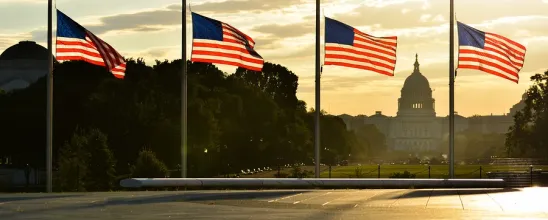Five weeks after passing the US$3 trillion HEROES Act, House Democrats are moving to pass a companion measure, the Moving Forward Act, that would add another US$1.5 trillion by funding an array of national infrastructure projects and related Democratic priorities. The bill is expected to be taken up on the House floor prior to Independence Day, after which bipartisan negotiations aimed at cobbling together the next major federal COVID-19 response measure are expected to commence. The new legislation will mean congressional Democrats enter next month’s talks seeking more than US$4.5 trillion in government spending – more than double the amount White House advisors say President Donald Trump wants, and more than four times the amount preferred by US Senate Majority Leader Mitch McConnell (R-KY).
Topics covered today include: tax and economic development, health, international trade, infrastructure, government oversight and US states developments.
Via POLITICO:
Just like that, Democrats have an infrastructure bill. The text of the $1.5 trillion legislation, given the symbolically weighty bill number of H.R. 2 , was released on Monday. . .[T]he surface transportation bill advanced by the House Transportation Committee last week is the centerpiece, but this is much more than a transportation bill. It addresses tax changes, energy and water infrastructure investments, housing, schools and more.”
The leaders of both parties agree the federal government must act this summer to provide the US economy with another significant infusion of money as it struggles to reopen. Enhanced unemployment benefits made available by Congress this spring as the nation went into lockdown are set to expire at the end of July, creating an action-forcing deadline that will bring Republicans and Democrats to the negotiating table next month to hammer out a consensus package. Federal Reserve Board Chairman Jerome Powell, the nation’s top monetary policy official, says the legislature must use its tax-and-spending powers to further support stabilization and recovery. But the two parties currently have vastly different views on how much aid is needed and how it should be structured and prioritized.
President Trump took executive action Monday to extend restrictions on immigration, steps the White House maintains are needed to protect US citizens as they strive to return to the nation’s workforce in the coming weeks and months. Via NPR:
President Trump on Monday extended a freeze on green cards for new immigrants and signed an executive order to suspend new H-1B, L-1, J and other temporary work visas for skilled workers, managers and au pairs through the end of the year.
The goal of the move is to protect 525,000 jobs as part of the White House response to job losses caused by the coronavirus pandemic, said a senior administration official, who spoke to reporters on the condition of anonymity. . .
The order targets H-1B visas, which are designed for certain skilled workers such as those employed in the tech industry, as well as L-1 visas, which are meant for executives who work for large corporations.”
As policymakers are positioning for next month’s COVID-19 discussions, Congress is also moving on key measures not related to the pandemic. Police reform bills are slated for floor action this week in both the Republican-led Senate and the Democratic-controlled House. The armed services committees are gearing up for work on the annual National Defense Authorization Act (NDAA), which sets US military policy for the coming year. Congress’ appropriations committees are preparing to move forward with spending bills that would fund the operations of the federal government after September 30, when the current fiscal year ends.
Tax and Economic Development Updates
Yesterday, Eric Rosengren, president of the Federal Reserve Bank of Boston – which is overseeing the Federal Reserve’s Main Street Lending Program (MSLP) – indicated that he currently expects “reasonable demand” for lending through the program. However, he also made clear that if there is a “serious second wave” of COVID-19 cases “in the fall or earlier, [] there are going to be a lot more firms that thought that they weren’t going to need financing that might need the financing.” According to Mr. Rosengren, there are over 200 banks currently going through the registration process and, by mid-July, the Federal Reserve should have a better sense as to how the MSLP is working, as it will be several more weeks before the central bank will begin purchasing loans from banks – though banks are currently able to begin making loans through the MSLP.
There also appears to be growing support in Congress for the creation of a new Federal Reserve 13(3) liquidity facility that would provide financial assistance to businesses in order to pay their real estate debt payments. According to Dow Jones, a bipartisan group of more than 100 lawmakers has sent a letter to Treasury Secretary Steven Mnuchin and Federal Reserve Chairman Powell noting that “[w]ithout a long-term relief plan in the face of an elongated crisis, [commercial mortgage-backed securities] borrowers could face a historic wave of foreclosures starting this fall, impacting local communities and destroying jobs for Americans across the country.” Separately, Bloomberg is reporting that various travel organizations – including the US Travel Association – are “pushing to allow destination marketing organizations – which promote cities or regions as attractive vacation spots – to apply for government-backed small business loans.” As you will recall, the Paycheck Protection Program (PPP) is not currently accessible to 501(c)(6) tax-exempt organizations. Secretary Mnuchin’s testimony before lawmakers earlier this month suggests that the administration is open to targeted relief for the travel industry, as well as for retail and leisure businesses, as part of any further COVID-19 relief package.
The Trump Administration also now appears open to discussing the best approach to supporting American workers during the current period of high unemployment. According to White House Economic Adviser Kevin Hassett: “Our view is that the unemployment insurance plus-up is something that we’re studying what to do next with, and that we will negotiate in good faith with Congress to think about next steps with that policy.” However, Senate Republicans, who are currently in the process of considering the size and scope of another potential COVID-19 relief package, have indicated that this is a “red line” they are unwilling to cross. Instead, a proposal by Senator Rob Portman (R-OH) that would provide a US$450 per week “return to work bonus” proposal for up to six weeks in lieu of the US$600 per week expanded unemployment payments appears to be the leading alternative solution in the upper chamber.
Finally, yesterday, House Democrats released the legislative text of their expansive infrastructure package, which includes a number of tax policy changes. In addition to providing tax credits for an array of “green energy” sources – including a five year extension of tax credits for wind and solar energy – the legislation would undo the limitations placed on advance refunding bonds as part of the 2017 tax law, and expand and make permanent the New Markets Tax Credit. The legislation would also create a new tax credit for municipal bond issuers to use for qualified infrastructure improvement. That said, House Democrats’ proposal faces a difficult path in the Senate, where Republicans have taken issue with the cost of the package – an estimated US$1.5 trillion – and are likely to oppose certain policies, such as the favored treatment of “green energy” over other energy sources.
Health Updates
The Food and Drug Administration (FDA) is now allowing an inhaled version of the COVID-19 treatment drug remdesivir to be utilized in clinical trials. Currently, the drug is administered by daily intravenous injections in hospitals. Daniel O’Day, chairman and chief executive officer of the pharmaceutical’s manufacturer, Gilead, said in an open letter that “[the company’s] hope is that earlier intervention could help patients avoid hospitalization altogether.” Meanwhile, a panel issuing COVID-19 treatment guidelines met over the weekend and is planning to issue further recommendations on the usage of the steroid dexamethasone. National Institute of Allergy and Infectious Diseases Director Anthony Fauci told Politico that he “would not be surprised if future clinical trials use this in combination with remdesivir.” As previously reported, a study conducted by the University of Oxford concluded that the drug cut risk of death in ventilated Covid-19 patients by one third and one-fifth for patients on oxygen. Further information on drug treatments is certain to be a topic of focus during today’s hearing in the House Committee on Energy and Commerce on the federal government’s response to the pandemic.
The White House is sending mixed messages regarding President Trump’s stance on the slowing of testing. As noted in yesterday’s report, the president said at a political rally on Saturday that, “when you do testing to that extent, you’re gonna find more people, you’re gonna find more cases. So I said to my people ‘slow the testing down, please.’” White House press secretary Kayleigh McEnany said in Monday’s daily briefing that the comment had been made “in jest” and that “any suggestion that testing has been curtailed is not rooted in fact.” According to CBS News, Vice President Mike Pence told governors on a call that the comments were a “passing observation.” However, in an interview with ABC on Monday, the president said, “if [testing] did slow down, frankly, I think we’re way ahead of ourselves, if you want to know the truth. We’ve done too good a job.”
Healthcare infrastructure is receiving attention in the House Democrats’ proposed transportation and infrastructure legislation. According to the committee’s “section-by-section”, the Moving Forward Act includes: US$10 billion to improve hospital infrastructure; US$10 billion for community health center capital project grants; US$4.5 billion for grants for the improvement, renovation or modernization of clinical laboratories that will improve SARS-CoV-2 and COVID-19 testing and response activities, including the expansion and enhancement of testing capacity at such laboratories; US$5 billion for the planning, design, construction, modernization and renovation of hospitals and outpatient healthcare facilities within the Indian Health Service (IHS); and US$500 million for grants to qualified teaching health centers and behavioral health centers to support the improvement, renovation or modernization of infrastructure at such centers, including to address COVID-19 or other subsequent public health crises. Although the legislation is unlikely to become law, the inclusion of funding for such improvements is an issue some stakeholders have requested in recent months. Hospitals, nursing homes, community health centers, laboratories and other provider sites have had to make investments in their facilities to accommodate changes due to screening and treatment of COVID-19.
Trade Updates
On Monday, President Trump signed a presidential proclamation extending the duration of his prior suspension of immigrant visas (for those entering the US permanently) and creating a new suspension for those seeking entry across a broad swath of nonimmigrant visas (those entering temporarily, particularly for employment). Our experts provide an in-depth analysis here.
Also late Monday, White House trade advisor Peter Navarro suggested that the China trade deal was “over.” Markets responded negatively almost immediately, but the White House and – via Tweet – the president himself walked Navarro’s statement back and confirmed the Phase One agreement remains intact. US companies are concerned that any action reinstating or escalating tariffs on goods from China could hurt their operations, on top of existing duties and the impacts of the COVID-19 pandemic on supply chains and consumer demand.
Trump officials are reportedly considering reinstating Section 232 national security tariffs on aluminum from Canada. As reported by Bloomberg Law, “[i]f Canada refuses to impose export restrictions on aluminum, the U.S. will announce Friday the re-imposition of 10% tariffs on aluminum from the country and implement the tariffs by July 1, according to the people, who asked not to be identified because the information isn’t public.” The US-Mexico-Canada Agreement (USMCA) is expected to enter into force on July 1. US lawmakers urged the administration to lift Section 232 tariffs on Canadian and Mexican exports in support of North American supply chains, and for many doing so was a critical prerequisite to taking up USMCA’s implementing legislation. It remains to be seen how Canadian officials will respond, but the agreement that saw a lifting of these tariffs included Canada’s pledge to respond to any reinstatement of tariffs with retaliatory action limited to steel or aluminum products, as appropriate (i.e., not targeting other categories of US exports to Canada).
Finally, also on Monday, the Transportation Department announced new limits on Indian airlines operating charter flights. The agency issued an order establishing that effective in 30 days, Air India will be required to obtain prior approval from US officials before operating certain charter flights to or from the United States. This action is in response to alleged actions by the Government of India restricting the operating rights of US carriers and allegations that it “has engaged in discriminatory and restrictive practices with respect to US carrier services to and from India.” According to Bloomberg, US officials argue that the government has banned all scheduled and charter flights to India by US carriers, while India is operating charter flights to repatriate citizens in the US and Air India is selling tickets to the public, in violation of the US-India Air Transport Agreement. The action comes shortly after the US and China mutually loosened restrictions on air carrier flights following a brief diplomatic standoff.
Infrastructure Updates
Yesterday, House Democrats unveiled the legislative text of their US$1.5 billion infrastructure proposal announced last Thursday. In addition to including the surface transportation reauthorization title, which was passed in a very contentious markup last week along party lines by the House Transportation and Infrastructure Committee, the bill includes funding and provisions related to schools and childcare, housing, broadband, drinking water and wastewater, clean energy, healthcare and the US Postal Service. House Speaker Nancy Pelosi (D-CA) announced that she wants to bring the bill to the floor prior to the July 4 recess. The House Rules Committee is tentatively scheduled to meet on the package the week of June 29.
Oversight Updates
Following the Administration’s mixed messaging on testing discussed above, Representative James Clyburn (D-SC), chair of Select Subcommittee on the Coronavirus Crisis of the House Committee on Oversight and Reform, has asked Vice President Pence and the heads of the Health and Human Services Department (HHS) and Centers for Disease Control and Prevention to release documents related to any efforts by the Administration to “slow down” COVID-19 testing. Pointing out that the pandemic “has killed more people in this country than any other nation on Earth,” Chairman Clyburn emphasized that “[n]o American should go untested because the President fears an accurate count of infections.”
Additionally, Democratic Leader Chuck Schumer (D-NY), and Senators Elizabeth Warren (D-MA), Richard Blumenthal (D-CT) and Edward Markey (D-MA) requested that the HHS Inspector General conduct a full review of all funding streams, programs and other congressional mandates related to COVID-19 testing to determine whether any programs have been “slowed down” at the request of President Trump or HHS political employees.
Also yesterday, another person was charged with fraud related to the PPP. The CEO of an information technology services company, Sosuda Tech LLC, allegedly submitted fraudulent applications for over US$13 million in PPP loans. In his applications, the defendant allegedly misrepresented the number of his employees and payroll expenses and falsely certified that the US was the primary residence for his employees. Based on these alleged misrepresentations, he was able to obtain over US$2 million in loans.
State Updates
Connecticut Governor Ned Lamont (D) said yesterday that while his state has a lower positive COVID test rate than many other states, he is looking at possibly implementing a regional quarantine with neighboring states Rhode Island and Massachusetts, and is reaching out to other governors as well. The governor said the quarantine would be tied to areas with higher positive test rates. “I’m envisioning people coming in from Bradley, Newark, Logan airports. They will be required to self-quarantine or show [they] were tested,” Lamont said. While still determining if this guidance will be implemented, the governor has continued to publicly call for increased testing and mask wearing to curb the infection rate in his state.
Georgia Governor Brian Kemp (R) is encouraging all Georgians get tested even if they do not have symptoms, as the state reported a huge surge in COVID-19 cases this past weekend. On Saturday, 1,800 new cases were reported in a 24-hour time span, the most to date and most since April 7. On Sunday, Georgia reported an additional 892 confirmed cases. On Monday, the total number of lab-confirmed cases was 65,928. The death toll has risen to 2,648, with 9,953 hospitalized, and 2,155 have been admitted to intensive care according to the Georgia Department of Public Health. Georgia was one of the first states to begin re-opening its businesses including bars, nightclubs, movie theatres and bowling alleys. On June 11, the governor signed an executive order to allow conventions to begin again and live performance venues to reopen starting July 1. While still in phase 2 of its reopening plan, there is no anticipated date yet for when phase 3 will begin.
Elaine Hillgrove contributed to this article.







 />i
/>i

